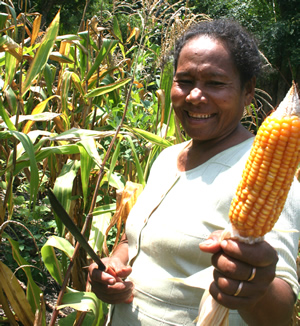Lucia Rodriques is a farmer who lives with her family in Liquica in the western districts of East Timor. In the past she has struggled to grow enough food to feed her family and to have enough crops left over to sell for income.
Lucia's life changed when she started to use maize varieties developed by the Seeds of Life Program, which is supported by AusAID and the Australian Centre for International Agricultural Research (ACIAR). Seeds of Life uses non-genetically modified technology to improve yields as well as increase resistance to drought and pests.
After switching to the new varieties of maize, Lucia's yields increased. In 2010, Lucia produced five 44 gallon drums of maize, her best ever yield. With this she has been able to feed her family and sell some surplus to pay for her children's school fees.
"This crop is very good quality. I received the seeds for it from Seeds of Life program in 2008. Since then, I feel that I have now produced more food for my family. I used to grow the local variety but it's not as plentiful as this," said Lucia while showing us the maize harvested from her garden.
Australia is proud to work with the Government of East Timor on Seeds of Life. It is a unique example of science and subsistence farming coming together to improve people's lives. Seeds of Life has been running for several years in East Timor. The first phase focused on researching improved crop varieties, while the second phase involved testing crop varieties on farms and distributing seed to farmers. . Between September 2008 and January 2011, improved varieties of maize, rice, sweet potato, cassava and peanuts were distributed to farming households. These improved crop varieties give yields that are between 24 and 159 per cent better than traditional varieties, and are now being used by 21,000 farming families across East Timor, benefitting around 125,000 people.
Australia is now funding a third phase of Seeds of Life that will expand the distribution of crops to many more farmers. By the end of 2015, it is expected that at least 81,000 farming households will be using higher-yielding crop varieties which will have a significant impact on food security in East Timor.

